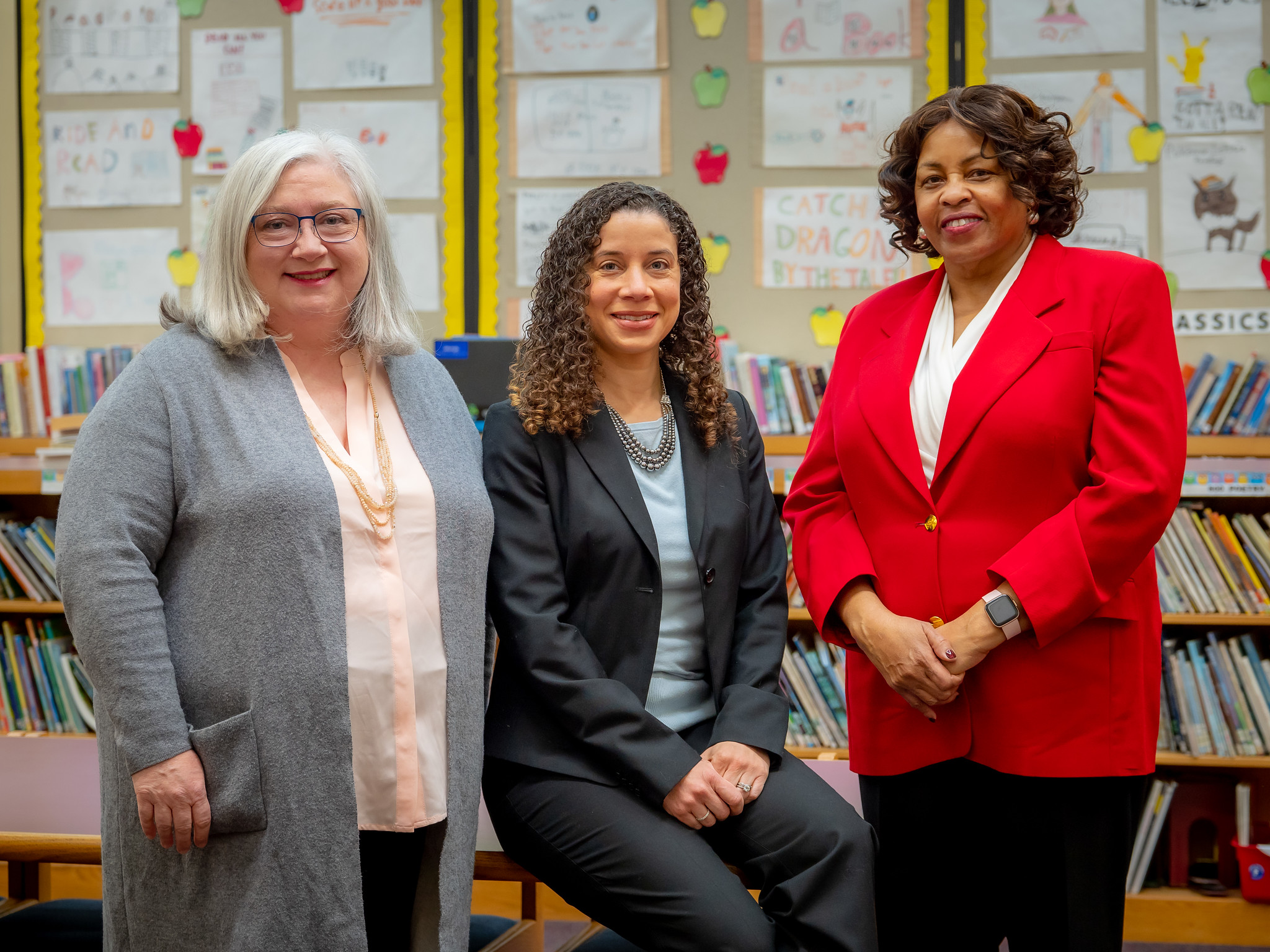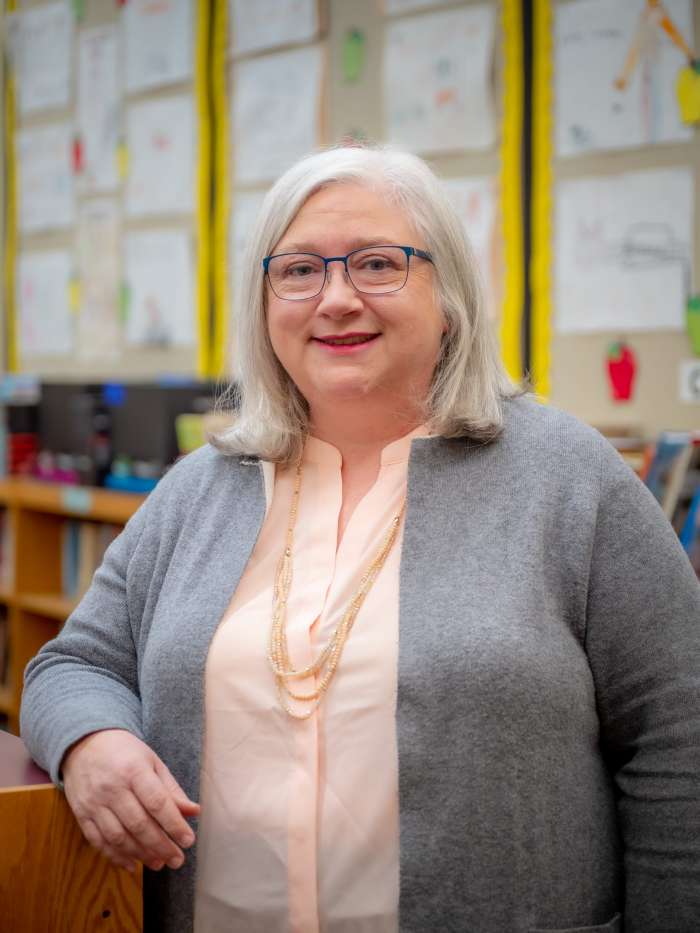Students Sub In
Substitute teacher prep program is a win-win for students and schools facing teacher shortages
Posted in: College News and Events

After her first day as a substitute teacher, Tiana Fedor, a junior majoring in Teacher Education, walked out of a kindergarten classroom, got into her car and burst into tears.
“It was happy tears,” she says. “I called my mom, and I told her I was crying. She was like, ‘That’s how you know that’s your passion, that you love it that much. That’s why it’s emotional.’”
Fedor agrees and recalls thinking: “This is definitely what I’m supposed to do.”
Olga Ramirez’s proud parents gave her a “Teacher” mug to celebrate her first day on the job as a substitute. The Montclair State University junior also has two other prized possessions: artwork of her carrying her “teacher things” in a purse created by her 7-year-old sister, America, who wants to follow in her sister’s footsteps and become a teacher, and a kindergarten student’s scrawled sign saying “Happy holidays, Miss Ramirez.”
“It was the first drawing from my student,” she says. “I was a stranger to them. So, the fact that I was able to make that one-on-one connection with that student was heartwarming because he didn’t have to do that for me. But it filled me with joy.”


Subbing Initiative
Fedor and Ramirez, both 20, already are certified as substitutes and are gaining valuable classroom experience after completing the University’s new Substitute Recruitment Initiative, more commonly known as SubIN, last fall. The two were eligible to become certified because they met the age and college credits requirements. (In October 2021, the state reduced the requirement from 60 college credits to 30 to help address the dearth of substitute teachers exacerbated by the COVID-19 pandemic. The shortage is not limited to New Jersey, as teachers are needed nationwide.) In addition, every substitute teacher candidate must pass a criminal background check and be a U.S. citizen or have a work visa to become certified in New Jersey.
“There is an incredible shortage of substitutes, which is, of course, related to a shortage of regular staff,” says Caroline Murray, assistant director of the Center of Pedagogy. “We are short of teachers in a way in my 25 years in New Jersey, I’ve never seen. And in my 18 years [at Montclair State], we’ve never seen this level of being short staffed.”
It was during a phone conversation with a colleague about the need for substitutes that Murray came up with the idea for the program last fall. So, she and her Montclair colleagues, Marilyn Davis, director of the Montclair State University Network for Educational Renewal, and Rhena Jasey-Goodman, induction coordinator for the Urban Teacher Residency, assisted by Rebecca Goldstein, associate professor in the Teaching and Learning Department, got to work and developed the program by mid-October. After several student information sessions, they launched the first SubIN training in November. Of the 163 undergraduate and graduate students from programs across campus who attended the sessions, 116 signed up for SubIN, according to Murray. Of those, 71 are in or planning to apply to teacher education and 45 are majoring in other disciplines, she says. Also of that total, 74 have completed the three-hour SubIN training and 15 already have begun subbing in classrooms. Those who have completed the training are diverse, with roughly half being students of color.

“One of the benefits of SubIN is that it is going to give students who are interested in teacher ed more opportunities for experience to make decisions about what certification program they want to do and to be able to successfully interview for the program,” Murray says.
SubIN is really for any University community member who enjoys working with children, has a passion for a certain subject area, wants to gain transferable skills, wants to contribute to their community at a time of need and is looking for flexibility. Participants are provided with workshops on how to apply for their substitute license, as well as an intensive three-hour training session. The training is led by Angela Piombo, a career educator and administrator who currently mentors beginning teachers. Piombo covers the nuts and bolts of subbing, along with everything from safety training and classroom management to how to dress and how to make a good impression with the principal. Both Feder and Ramirez say the SubIN training was helpful and gave them the confidence they needed when walking into the classroom.
“She [Piombo] really prepared us…so we wouldn’t show up the first day and be like, ‘Oh my goodness, what’s going on?’” says Feder. “If it wasn’t for her, I would honestly probably be lost.”
Ramirez agrees. Although she already had her substitute certification, Ramirez participated in the SubIN program to learn “tips and tricks to be able to use in the classroom.” She found it beneficial, particularly the discussions and exchange of ideas among participants.
“That was what taught me the most because sometimes you think of a situation through one perspective but going to the workshop helped me see the situation from different perspectives because everybody was providing solutions to solve one problem,” she says. “There’s multiple ways that I’m able to use that now to substitute, so it was really great.”
Feder and Ramirez recommend the program and subbing, noting that it provides maximum flexibility, helps make connections for possible future employment opportunities, allows one to try different grade levels to see which appeals to them (they both want to teach younger children), and pays more than minimum wage jobs. Subs can earn from $125 to more than $200 a day, depending on the school district.
For Feder, it meant she no longer had to babysit or dog sit for $10-$12 an hour, she says, adding that she was able to sub regularly in her hometown of Monroe Township while on winter break. Meanwhile, Ramirez was able to scale back on her hours at Marshalls.
“This is better than students often typically are making in other kinds of roles. And it’s giving them this fantastic experience,” Murray says. “It’s not just a win for our partner districts, but it’s a win for students at the University who need flexible work options.”
Advantages of subbing
One of the places students can substitute is Montclair’s Bradford Elementary, the University’s magnet school, which is within walking distance of campus. Principal Frances Aboushi, who took the school’s helm last May, hosted a substitute teacher open house at Bradford last November. In addition to getting substitutes for her school, Aboushi says, the students can sub at any of the 11 campuses in Montclair Public Schools.
“The demand is great,” she says. “Even before the pandemic. It wasn’t as dire as it is now but you’re always in need of subs; you could have eight people out in one day.”
Another plus for substitutes: They can pick and choose when and where they work.
“If you are in the system, that means anybody who puts in for a sub, you will get the notification,” Aboushi explains. “For example, you’ll get notified that there is a request for a sub in Bradford or Montclair High School or Renaissance Middle School for a particular grade. You either can take it or you just ignore the notification.”

When subs are not available, Aboushi says, “staff wind up picking up the load to sub during their prep period or their lunch periods and they get paid, so that’s how we’ve been managing.”
Murray says that while the University is helping the school district and other districts with a “most critical piece of staffing,” the program is providing quality training.
“We’re not just recruiting students and then sending them out. What we’re doing is training. We have a reputation in teacher education at Montclair State, and so if we’re going to do something, we’re going to do it right.”
SubIN began with seven partner districts and now partners with 20 districts where program participants can sub. In addition, plans are in the works with the Newark Board of Education to help prepare Newark’s substitute teachers.
“We’re going to take our training on the road,” Murray says. “We’re going to have a special training using the model that we’ve created to help support the subs in the district.” Plans are also in place to provide monthly check-in meetings with SubIN participants who have questions or who would like additional support.
This is the fruit of her parents’ desire for a better life; Ana Flores and Donaldo Ramirez, whose educational dreams were deferred, came to the U.S. from Puebla, Mexico, in 2001.

“I’m just living their dream,” Ramirez says. So is her sister Joanna, a Montclair State freshman studying Child Advocacy, who hopes to become a social worker.
For Ramirez and Feder, there’s the added fulfillment of doing what they love.
“Once I said I wanted to go to school for teaching, it was ‘I’m going to be teaching,’ nothing else,” Ramirez says.
“Sometimes it doesn’t even feel like a job because it’s something I truly like to do,” Feder says.
For more information on the SubIN program or to attend an information session, visit the Center of Pedagogy’s SubIN page. The next SubIN training is scheduled for Saturday, February 26 via Zoom.
Story by Staff Writer Sylvia A. Martinez, Photos by University Photographer Mike Peters
